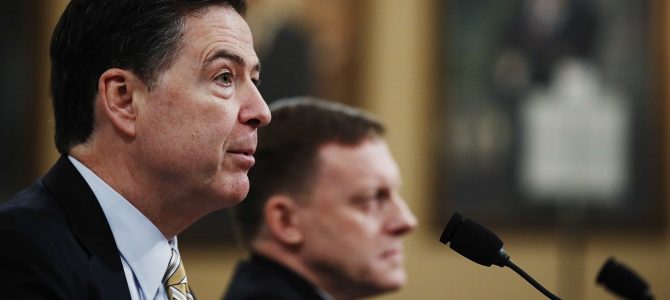During his testimony to the Senate Intelligence Committee on Thursday, former FBI director James Comey revealed that he was the source of leaked memos about his conversations with Donald Trump surrounding the Russia investigation. Comey explained that he shared the memos with his friend, a professor at Columbia University, who then shared them with the New York Times, actions that may violate the FBI’s own employee agreement.
“My judgment was I needed to get [the memos] out into the public square,” Comey said. “So I asked a friend of mine to share the content of the memo with a reporter. I didn’t do it myself for a variety of reasons, but I asked him to because I thought that might prompt the appointment of a special counsel.”
By his own account, it seems that Comey may not have followed the agency’s employee agreement, which places numerous restrictions on the use of information or documents acquired during an individual’s employment by the FBI. Paragraphs 2, 3, and 4 of the FBI employment agreement appear to cover Comey’s distribution of content he says he created on government property in his capacity as a government official:
Paragraph 2 states that all materials acquired in connection with an employee’s official duties are property of the U.S. government and that such materials must be surrendered to the FBI upon an employee’s separation from the agency. Paragraph 3 states that employees are prohibited from releasing “any information acquired by virtue of my official employment” to “unauthorized individual[s] without prior official written authorization by the FBI.” Paragraph 4 of the agreement requires FBI employees, prior to disclosing or publishing information acquired during their employment, to submit the information to FBI authorities for review to determine whether it is authorized for public release.
So if Comey followed protocol and surrendered all government property, including the memos he produced in his capacity as an FBI employee, it would have been impossible for him to provide the memos to his friend. The fact that he was able to provide hard copies of the memos to both his friend and special counsel Robert Mueller suggests that Comey did not surrender them to authorities as required by the FBI employment agreement.
Page two of the agreement lists the types of information disclosures which are strictly prohibited. Included in the list of information that may not be released without prior written approval by the FBI is “information that relates to any sensitive operational details or the substantive merits of any ongoing or open investigation or case.” While the agreement states that unauthorized disclosure of classified information is a violation of the contract, information does not have to be classified in order to be prohibited from unauthorized disclosure. Comey claims that his memos were unclassified.
Comey’s claim that it would not have been proper to publicly disclose that Trump was not a target of any FBI investigation because the investigation was ongoing and facts could change flies in the face of his decision to provide to his friends records of his meetings about the investigation with the president. If he could not publicly note that Trump was not a target of an ongoing investigation, then why was he able to release FBI records related to that investigation to his friends for the purpose of having those details leaked to the public via the news media? In light of the FBI’s prohibition on publicly sharing documents or information related to ongoing investigations absent prior written authorization, Comey’s dual explanations make little sense.
The FBI employment agreement states that violating any of the included terms may result in termination, civil liability, revocation of security clearances, or even criminal sanctions.








